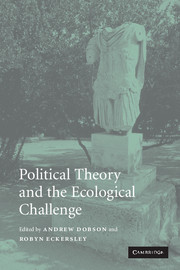6 - Communitarianism
Published online by Cambridge University Press: 06 July 2010
Summary
Introduction
Can communitarianism meet the ecological challenge? In keeping with the purposes of this volume, I interpret this challenge to mean, ‘Does communitarianism provide the appropriate insights, conceptual resources and norms to guide political communities along ecologically sustainable paths?’
This question admits of no straightforward answer because communitarians are an unruly bunch who defy simple political classification. Communitarians can be more easily identified in terms of what they are against rather than what they are for. We all know that communitarians are critical of cosmopolitanism (see Linklater, chapter 7 in this volume) and the Enlightenment idea of Universal Reason, but it is not always easy to find a common thread in their positive political prescriptions. Some are conservative or traditional while others are civic republicans. Some draw on Aristotle, others on Hegel. Some communitarians have a theoretical affinity with postmodernism while others find common cause with realism. There are also some interesting hybrids, such as liberal communitarians, liberal nationalists and Third Way ‘new communitarians’, who are keen on rebuilding social capital so we no longer go ‘bowling alone’.
Despite this political diversity, it is possible to single out one preoccupation that does unite communitarians, and that is a special preoccupation with questions of identity and the significance of social bonds. It is this preoccupation that partly explains their critique of cosmopolitanism, on the one hand, and the diversity of their political prescriptions, on the other (after all, there are many different ties that bind people together).
- Type
- Chapter
- Information
- Political Theory and the Ecological Challenge , pp. 91 - 108Publisher: Cambridge University PressPrint publication year: 2006
References
- 4
- Cited by



